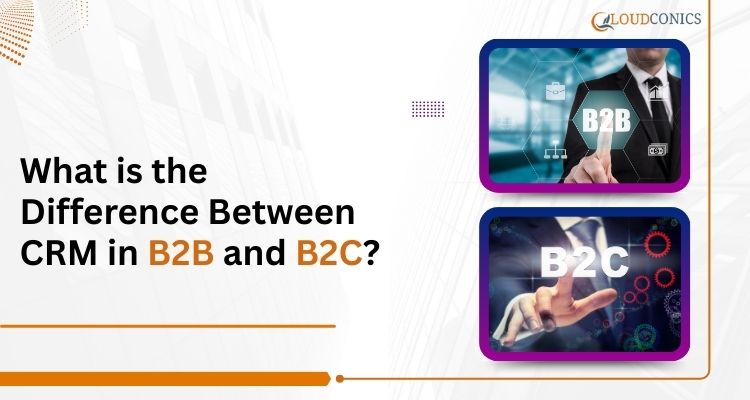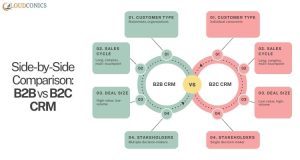
 January 20, 2026
January 20, 2026
What is the Difference Between CRM in B2B and B2C?
In today’s customer-centric world, businesses rely on CRM (Customer Relationship Management) systems to strengthen relationships, streamline communication, and drive growth. But not all CRM strategies are created equal—especially when comparing B2B (Business-to-Business) and B2C (Business-to-Consumer) models.
While both aim to enhance customer experience and increase retention, the way CRMs are designed, implemented, and utilized can vary dramatically based on whether you’re selling to a business or an individual consumer. These differences influence everything from how data is managed to how marketing campaigns are executed.
In this blog, we’ll break down the key differences between B2B and B2C CRMs, provide a clear comparison, and guide you toward the right solution for your business.
Key Differences Between B2B and B2C CRM Strategies
While both B2B and B2C businesses aim to build strong customer relationships, their approaches to CRM (Customer Relationship Management) differ significantly due to variations in customer behavior, sales processes, and engagement strategies. Understanding these differences is essential for selecting the right CRM system that aligns with your business goals.
1. Sales Cycle Complexity
- B2B: Sales cycles are typically longer and involve multiple stages such as lead qualification, product demos, proposals, and negotiations. A B2B CRM must support pipeline visibility and detailed follow-ups across various stakeholders.
- B2C: Transactions are generally quicker, often completed in a single session or interaction. A B2C CRM emphasizes speed, responsiveness, and ease of purchase to convert high-volume leads into customers efficiently.
2. Customer Relationships
- B2B: Relationships are long-term and built on trust, consistency, and account management. CRMs in B2B prioritize account-based marketing, long-term nurturing, and personalized service.
- B2C: Relationships are more transactional and emotionally driven. B2C CRMs focus on understanding customer preferences, behavior, and lifecycle to deliver timely and personalized experiences.
3. Data and Analytics
- B2B: CRMs manage rich, structured data for each company, including contact roles, communication logs, purchase history, and contracts. Analytics support forecasting, pipeline tracking, and account health scoring.
- B2C: CRMs collect and analyze behavioral data, including website visits, purchase frequency, product preferences, and campaign engagement. This supports personalized marketing, upselling, and customer retention.
4. Marketing and Automation
- B2B: Marketing efforts are highly targeted and content-driven (e.g., whitepapers, webinars, LinkedIn outreach). Automation revolves around lead scoring, nurture sequences, and sales team alerts.
- B2C: Marketing is often broad and high-volume, including email campaigns, SMS promotions, and social media ads. Automation enables real-time customer engagement and abandoned cart recovery.
5. Customer Support and Service
- B2B: Support may include dedicated account managers and custom SLAs. The CRM tracks service requests, technical support history, and satisfaction over time.
- B2C: Fast, scalable support is key—often through chatbots, help centers, or integrated customer service tools. CRMs enable quick case resolution and feedback collection.

How to Choose the Right CRM for Your Business ?
Selecting the right CRM platform is more than just choosing a popular brand—it’s about aligning with your business model, sales strategy, and growth goals. As a Zoho Partner and Cloudconics Advanced Partner, we’ve helped many businesses across industries find and implement CRMs that transform their operations.
Here’s what to consider:
- Sales Process Complexity: Do you manage long-term deals or fast, recurring sales?
- Customer Volume: Are you targeting a few key accounts or a large customer base?
- Integration Needs: Does the CRM integrate with your existing tools (e.g., email, marketing platforms, help desk)?
- Scalability: Can the platform grow with your business?
For example, Zoho CRM offers tailored solutions for both B2B and B2C models, with flexible modules and seamless automation tools.
Why CRM Isn’t One-Size-Fits-All
While CRM platforms may share core functionalities, the way they’re used in B2B and B2C scenarios varies greatly. A B2B business needs tools for tracking relationship history and managing deals through long sales funnels. In contrast, a B2C business focuses on personalization, campaign automation, and customer engagement metrics.
Choosing a CRM that doesn’t align with your needs can result in underused features, wasted costs, and frustrated teams.
That’s why it’s important to partner with experts like Cloudconics, who can guide you to the best-fit solution.
Need Expert Guidance?
Whether you’re transitioning from spreadsheets or switching from one CRM to another, navigating CRM implementation can be overwhelming. At Cloudconics, we specialize in helping businesses of all sizes deploy Zoho CRM effectively—tailoring every aspect to fit their B2B or B2C model.
From initial consultation to deployment and training, we offer end-to-end CRM solutions designed for impact.
Final Thoughts
The distinction between B2B and B2C CRM is not just technical—it’s strategic. Understanding these differences helps you choose, customize, and utilize a CRM that drives real results. With the right system in place, you’ll improve customer satisfaction, streamline operations, and unlock new growth opportunities.
Ready to implement a CRM that matches your business model? Book a call with Cloudconics, your trusted Zoho Partner, and let’s build your future-ready CRM today.



